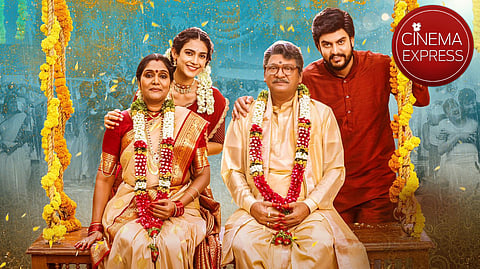Shashtipoorthi movie review: A technically strong melodrama marred by its outdated sensibilities
Shashtipoorthi review(1.5 / 5)
Shashtipoorthi movie review: There’s a certain warmth to the word Shashtipoorthi, a celebratory milestone of turning sixty, usually filled with nostalgia, grace, and the symbolic renewal of marital vows. But director Pavan Prabha’s film of the same name is caught between wanting to honour that sentiment or merely borrowing the term to decorate what is otherwise an oddly disjointed domestic drama. Shashtipoorthi wants to be a moral tale about estranged parents, generational divides and the idealism of youth but instead settles into a story that feels like a hastily stitched soap opera, albeit with clean technical values and solid performances.
Director: Pavan Prabha
Cast: Rupeysh, Aakanksha Singh, Archana, Rajendra Prasad
The film follows Sri Ram (Rupeysh), a public prosecutor raised on a diet of Gandhian values and pristine moral codes. He is distanced from his parents, Divakar (Rajendra Prasad) and Bhuvana (Archana), who live together but parted ways long ago due to conflicting ideologies. The film takes pains to establish Sri Ram as a paragon of righteousness very early on. But that lasts until he meets Janaki (Akanksha Singh), whose love seems to come with a rather sudden and narratively unearned price. She tells him to abandon his values and chase comfort. Sri Ram obliges almost instantly, transforming from an upstanding everyman to a part-time philosopher and a full-time sellout. The issue here isn’t that the characters change. They can. But they must also evolve in an emotionally traceable way. Sri Ram’s (Rupeysh) arc is less an evolution and more a switch flicked for convenience.
The screenplay asks us to invest in his struggle but skips the hard part by giving us believable reasons for that struggle. It’s all told, rarely shown. Decisions appear because the story needs them, and resolutions happen because a character delivers a deep line, not because the characters earn them.
This is more prominent in the film’s central conflict, viz., the emotional rift between Divakar and Bhuvana. On paper, it’s a potent dynamic. A couple divided by worldviews, still living under the same roof filled with memory and resentment. But the writing treats it with the same broad strokes it applies to everything else. Their ideological conflict hinted at with promise is eventually resolved in the most laughably simplistic manner: a courtroom reconciliation driven by a poetic speech from their son. Bhuvana, who spent decades holding her ground, suddenly melts because the script needs to wrap things up before the next scene, which is the Shashtipoorthi ceremony. It’s not emotional closure, it’s an emotional loophole.
Still, some things work. Rajendra Prasad and Archana deliver beautiful performances with ease, which is provided by years of collaboration and familiarity. Archana, especially, brings an uncommon quiet strength to her role. It’s rare in Telugu cinema to see an older woman be the moral compass of a family without being turned into a cliché, and Archana walks that tightrope with admirable grace. The scenes between her and Rajendra Prasad carry the weight of shared history even when the script does not. You believe they have lived a life together, even if the dialogue rarely justifies it.
Rupeysh Chowdhary, who is making his acting and production debut, surprises by not placing himself at the centre of a hero-worshipping spectacle. His character is allowed to be wrong, to fall, and to fail. These choices alone are worth noting. His performance isn’t flashy, but it suits the film’s tone and goes along with the film’s core idea. Akanksha Singh brings a grounded presence to Janaki, although her character's motivations remain fuzzy. Like much of the script, she serves a purpose rather than possessing a personality.
And then there’s Ilaiyaraaja’s music. The maestro’s vintage melodies are among the film’s few genuine pleasures. His compositions lend a sense of emotional gravitas that the writing often fails to provide. There are moments when the score does the acting for entire scenes. You find yourself enjoying the atmosphere more than the action and the rhythm more than the reason. These songs, in a better film, would have soared. Here, they provide life support.
The production design by Thota Tharani is similarly commendable, offering a visual polish that far outshines the storytelling. There’s a lived-in charm to the spaces the characters inhabit, from the ancestral home to the courtroom, but the drama within those spaces feels clumsily staged.
Where the film falters most glaringly is in its reliance on familiar television tropes. Conversations are overwritten, dramatic beats are signposted well in advance, and emotional cues arrive like clockwork, which are timed more for effect than authenticity. There’s a stiffness to the dialogue and a reluctance to let silence do any heavy lifting. When big reveals come, they are neither surprising nor particularly moving.
Shashtipoorthi aims to be about healing and the cyclical nature of familial bonds, but it does so with a pen dipped in sugar syrup and a structure borrowed from Sunday afternoon soaps. Its attempts at profundity are repeatedly undercut by narrative shortcuts. A family that took decades to break apart is magically reunited with a few flourishes of speech. A man’s core values dissolve faster than the opening credits. Conflict arises not from character, but from convenience.
Yet, there’s sincerity here. You can feel it in the score, in the eyes of the veterans, in the film’s desire to say something meaningful about relationships and compromise. But good intentions need good craft, and Shashtipoorthi doesn’t trust its own story enough to let those emotions speak truthfully. This is the kind of film where you clearly understand the distinction between strong technical ability and clear directorial craft; both appear to be the same thing, but no! This drama shines in its visuals and its sounds but falls flat with its emotion. In the end, it’s a film that becomes a tedious sit-through without offering any real intended resolution.

